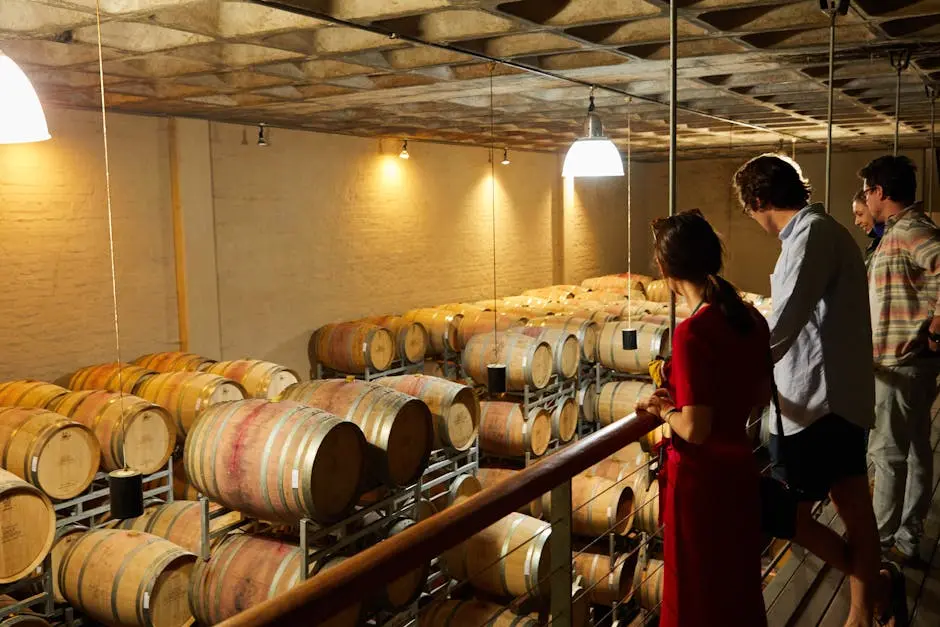Embarking on a wine tasting journey can be as much about savoring flavors as it is about understanding sustainable practices in the industry. In recent years, sustainability has become a key focus for many wineries. Whether you’re a connoisseur or a curious beginner, knowing what to look for can enhance your wine tasting experience ethically and environmentally.
Seek Out Organic and Biodynamic Wines
Organic and biodynamic wines are produced without synthetic chemicals and with respect for natural ecosystems. Look for certifications, such as USDA Organic, on wine labels.
While enjoying a wine tasting experience, selecting wines produced through organic or biodynamic means significantly reduces the chemical footprint in local soils and water sources. This practice not only benefits personal health by eliminating synthetic residues but also enhances the biodiversity of the vineyards themselves. Biodynamic practices go a step further by incorporating holistic agricultural approaches aligning with lunar cycles, enhancing the terrestrial energy of the vines and their produce.
In addition to checking for organic certifications, you can inquire about the specific farming practices the winery engages in. Some wineries even offer tours or informational sessions where they delve into their farming philosophies and methods, offering a deeper understanding of what makes their wine both environmentally friendly and uniquely flavorful.
Inquire About Water and Energy Conservation Efforts
Ask wineries about their practices in conserving water and energy. Many are implementing innovative irrigation techniques and solar energy to minimize their environmental impact.
Water and energy are vital resources in wine production, and conscientious wineries are employing cutting-edge conservation techniques. For instance, some wineries utilize drip irrigation systems, which precisely distribute water directly to the plant roots, vastly reducing water wastage learn more about drip irrigation systems. An equally impressive approach is the adoption of renewable energy sources like solar panels, which power wine production facilities with sustainable energy, effectively lowering carbon emissions.
A commitment to sustainable wine production is evident in wineries that invest in technology to monitor and manage water use effectively. By leveraging data analytics and IoT devices, vineyards can optimize their resource use, ensuring that each drop of water is used wisely to foster the best grape yields.
Explore Packaging Choices
Sustainable wine production often includes the use of lightweight glass, recycled materials, or alternative packaging. This reduces the carbon footprint associated with transportation and packaging waste.
Packaging is an often overlooked aspect of sustainability but plays a crucial role in eco-friendly practices. The carbon footprint of wine can be markedly reduced by selecting wines packaged in materials like Tetra Pak or aluminum cans, which are not only easier to transport due to their lightness but also simpler to recycle compared to traditional glass.
When purchasing wine, observe the packaging labels for information on recycled content or symbols reflecting the winery’s commitment to reducing packaging waste. Some wineries are now offering refilling stations where customers can bring their bottles back for a refill, encouraging a circular economy and reducing the need for single-use bottles.
Understand the Vineyard’s Commitment to Local Ecosystems
Responsible wineries actively work to preserve their surrounding ecosystems. This includes maintaining natural habitats, protecting wildlife, and adopting sustainable agricultural practices.
The environmental health of vineyard ecosystems is integral to sustainable practices. Cover cropping is one such practice where non-vine plants are grown to benefit the vineyard ecosystem. They improve soil health, manage water more efficiently, and help in controlling pests naturally, reducing dependency on synthetic chemicals.
Many vineyards work closely with environmental organizations to ensure their farming practices aid in the conservation of local flora and fauna. It’s often part of larger community engagement projects supporting biodiversity, including beekeeping initiatives and wildflower planting, which contribute to healthier ecosystems.
Support Wineries with Fair Labor Practices
Ethical sustainability includes fair treatment and compensation for farmworkers. Inquiring about a winery’s labor practices contributes to an informed and responsible wine tasting experience.
Behind every bottle of wine is the hard work of numerous hands. Supporting wineries that ensure fair wages and provide safe working conditions for their laborers is just as important as environmental efforts. Workers’ rights are a critical aspect of sustainability, and certifications such as Fair Trade indicate a commitment to social equity explore what Fair Trade means.
Beyond fair wages, consider wineries that invest in the well-being of their employees, offering professional development opportunities and educational programs. Such initiatives foster a positive working environment and sustain the cultural richness of the winemaking tradition by supporting those who carry it out.
Savor the Experience, Sustainably
By seeking out these sustainable practices in your wine tasting adventures, you’re not only enjoying delicious wine but also supporting environmentally friendly and social-conscious wine production. Cheers to making mindful choices that benefit our planet and future generations!



